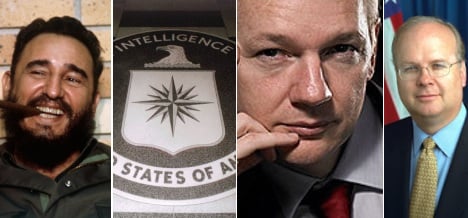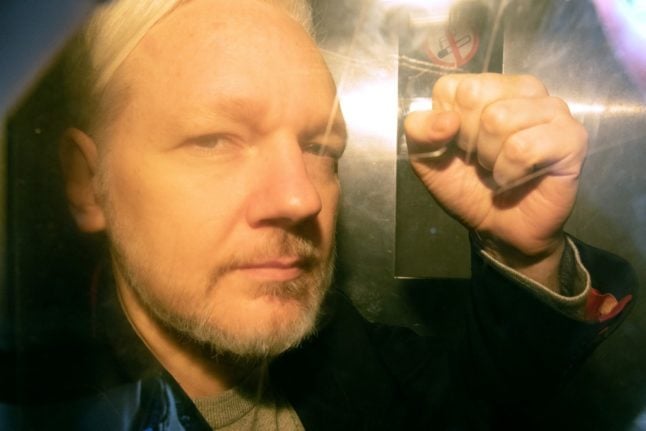It could be considered an odd twist of fate for the 39-year-old Australian that his personal secrets are up for scrutiny in a court of law, rather than the secrets divulged on his whistle-blower website.
The story took another ironic turn at the weekend when details of the sex crimes allegations against Assange were leaked online at the weekend, exposing previously confidential information in a manner similar to the methods on which WikiLeaks built its reputation.
Since coming to light at the end of last summer, the hotly followed case of Assange’s sexual encounters with two Swedish women, aged 26 and 31, have spun a myriad of theories suggesting there’s evermore to the story than a simple one-night-stand gone sour.
The thrilling combination of a high-profile yet mysterious Assange, his WikiLeaks’ exposure of thousands of highly sensitive diplomatic cables, and one inflamed US government have unleashed a flood of inevitable conspiracy theories, offering everything from the simple to the far-flung.
Some theorise the alleged victims have accused Assange out of anger or jealously, while others believe the sex crime allegations are part of a much more complicated plot involving Swedish security service Säpo and a mentally unstable serial killer, who happens to have been represented by a lawyer involved in the Assange case.
Three theories related to Assange’s case which have circulated widely focus on a possible US-connection to the accusations: the idea that one of the alleged victims works for the CIA; that the United States has hijacked the Swedish judicial system; or that American Republican political strategist and former advisor to George W. Bush Karl Rove is a master puppeteer pulling strings behind the scenes.
Assange and his lawyers have been all too happy to fuel the flames of conspiracy, themselves painting the accusations as a “smear-campaign” to bring down Assange and WikiLeaks.
So could one of the complainants actually work for the CIA? Is the case really a ‘honey-trap’ designed to deliver Assange to salivating US officials so they can proceed with potential espionage charges?
The facts according to public records state one of the alleged victims is in fact a member of The Brotherhood, a leftist Christian faction of the Swedish Social Democratic Party. She invited Assange to speak at a Brotherhood event, offered him accommodation at her apartment, and had sex with him.
“Historically there are very few (honey-trap) cases and they are usually of a very different character to his case, which does not have the character of a pre-designed trap,” says Professor Wilhelm Agrell of Lund University, one of Sweden’s experts on intelligence gathering, national security and other related issues.
“There are easier and far more effective ways to reach that goal – stuff up his bag with narcotics.”
It gets juicier. She also once hosted a blog titled “Seven Steps to Legal Revenge” on ex-lovers and is alleged to have worked with a feminist Cuban anti-Castro group. The opposition movement, Las Damas de Blanco (the Ladies in White), is said to be partly funded by the American government.
Add them together: a leftist feminist who once blogged about how women can use the legal system in seeking revenge on unfaithful lovers and who may have worked for a US-backed women’s group in Cuba. In one quick sweep, she suddenly becomes a CIA operative, sympathetic to the US WikiLeaks embarrassment and prepared to take down Assange at whatever the cost.
“It’s preposterous,” says Billy McCormac, an American senior advisor at Stockholm’s Prime Group and resident scholar of Swedish think tank Timbro.
“It pre-supposes a tactical competence that the CIA doesn’t obviously have and I fail to see how they could pull this off with any degree of success.”
True. The CIA is not known for their stealth-like covert operations and there are no official records of the alleged victim having any direct connection to the CIA or the US government. The blog appears to have been a translation of joke material from another website, leaving us back where we started: one of the accusers has leftist political sympathies. Nothing new there.
Moving on.
Is it possible that the accusers’ legal representation are taking orders from the government, who in turn are acting at the behest of US forces applying pressure behind the scenes?
The historically close relations, both formal and informal, between the United States and Swedish governments, naturally elevate suspicions. Add to that the seemingly erratic way in which the case has been handled with charges filed, the most serious dropped, the arrest warrant revoked, charges appealed. Finally we are left with four accusations and an Interpol manhunt. It’s not hard to see why conspiracy theorists’ interests have been aroused.
Could the United States manipulate the Swedish judicial system?
“There is no proof that makes it likely but it cannot be completely ruled out,” says Agrell.
“It’s still quite a stretch though and given the integrity of the legal system and the integrity of the prosecutors, it is most unlikely. It would be far, far too damaging.”
In addition, the alleged victims’ lawyer, Claes Borgström, is a former minister in the Social Democratic Party and served for seven years as the national government’s Equality Ombudsman. In 2007, he joined forces with former Social Democratic Minister for Justice Thomas Bodström, and together opened a law firm, Borgström & Bodström.
It is uncertain whether the women involved sought out this particular firm’s services or vice versa. But now there are two well-known, well-connected counsels with ties in both countries involved in a highly publicized case.
When considering all these fragments, the dots, though far-stretched, might seem to connect and emerge as an exciting image of secret plots, political manipulation and extreme measures.
“It’s all relatively insulting toward the Swedish government and its legal system,” says McCormac.
“People want it to be true; they would love nothing more than to prove that American interests are manipulating Swedish decisions. But there is no proof because it just didn’t happen. Reality is far more banal than people want to accept.”
And then there’s the Karl Rove bent.
Is the former Bush advisor directing the show, pulling strings with politicians in a grand scheme to bring Assange to US soil? Or, is Rove trying to protect the Bush administration or his own role in activities that WikiLeaks might access?
“It’s utter conjecture,” says McCormac, who maintains a professional acquaintance with Rove.
“What could Karl Rove possibly gain in influencing Swedish politics? It affords Sweden far too great a significance in the global scene.”
Rove, who officially served as a White House Senior Advisor and Deputy Chief of Staff under Bush, is known to ardently disapprove of WikiLeaks. He also has been associated with several high- profile political scandals. Couple these facts with his 2008 visit to Sweden and a seductive story begins to present itself.
“It was an election year for Sweden and we wanted to talk about it from a different perspective than Swedes are accustomed to,” says McCormac, who was partly responsible for bringing over the expert political strategist credited for both of Bush’s presidential victories.
According to McCormac, who shadowed Rove during his visit, the US political advisor made one public speech, one private speech and hosted one semi-private dinner in a restaurant without giving a speech.
“I see the excitement. You have the idea of Karl Rove in Sweden with politicians in the room doling out advice and dirty tricks to win elections and push agendas,” says McCormac.
“It’s very easy to make that leap. But there is no substance to it. It was all really undramatic, more of a nerdy political discussion.”
Nevertheless, the public is eager to know the truth behind WikiLeaks, its controversial frontman and whatever may have happened behind closed doors. The allegations related to sex crimes add another frothy layer of enticement to the saga and the theories will undoubtedly continue to swarm.
“I understand this perceived witch hunt of Julian Assange is exciting for many people,” says McCormac.
“But I fail to see how any of this would really happen. It pre-supposes a completely airtight coalition of co-conspirators, which would never happen. It’s impossible.”
The truth, it seems, may be more prosaic than many of Assange’s sympathisers are making out.
“Conspiracy theories offer an overarching explanation to things which are unexplainable,” says Agrell.
“We have difficulty in accepting that events actually have no logical connection; that events just happen.”
Whatever the outcome of his extradition hearing in London, Assange has likely assured himself a place in history – although that legacy may be inextricably linked with the many conspiracies that his ordeal has inspired.
And as his legal battle continues, the flood of conspiracy theories will likely continue, no matter what the final outcome.



 Please whitelist us to continue reading.
Please whitelist us to continue reading.
Member comments